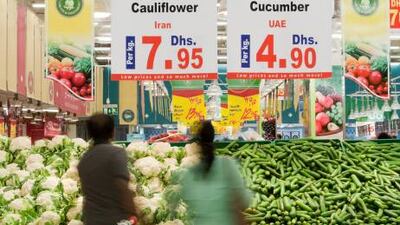DUBAI // Food safety officials are confident the UAE will avoid contamination from the deadly E.coli outbreak that has killed 23 people in Europe and left thousands ill.
Stringent food testing procedures remain in place, and supermarkets say their produce is sourced locally or from other countries in the Middle East.
MORE UAE NEWS: Our pick of today's top local news stories
Last Updated: June 7, 2011
Briton's extradition to face Dh2m Dubai World charge likely today Michael Bryan Smith, accused of embezzling more than Dh2m from a property company, is expected to be extradited from Thailand after spending two years in jail there. Read article
Australian woman wins bid to sue her government over UAE jailing Woman who was jailed for adultery over alleged Fujairah hotel rape has been granted leave to sue her own government for failing to provide advice on UAE laws. Read article
Empty filling stations and the great fuel mystery Petrol retailers say the filling-station closures are necessary for 'technical upgrades' but there is little sign of maintenance at petrol stations in Sharjah, and fuel shortages persist. Read article
Sheikh steps in to save RAK sailing club Country's oldest sailing club will be demolished to make way for a new property development, but plans are afoot to rebuild the club 500 metres down the road. Read article
Scientists in Germany, where most of the deaths occurred, initially blamed imported Spanish cucumbers for the outbreak, but subsequently traced the bacterium to beansprouts from a farm in Uelzen in the state of Lower Saxony, 70km south of Hamburg in northern Germany.
The farm has been shut down and its produce recalled. However, initial tests conducted on beansprouts from the farm have proved negative. Tests on 23 of 40 samples indicated they were free of the bacterium, officials from the state's agriculture ministry said yesterday.
Beansprouts have not been added to the list of banned imports issued a week ago, which includes cucumber, lettuce and tomatoes from Germany, Spain, Denmark and the Netherlands.
"As of now everything is still the same as the import ban imposed by the Ministry of Environment and Water," said Khalid Mohammed Sharif, the director of the Food Control Department at Dubai Municipality.
"We have not had any cases of E.coli linked to those in Europe and with the procedures we have put in place I don't think it will be a problem for us."
Supermarkets said any extension of the ban to include German beansprouts would not affect them.
"We don't sell the German imported beansprouts and instead get our stock locally or from the Mena region," said a spokesman for the EMKE Group, which runs the LuLu chain of hypermarkets.
"We were told by the Abu Dhabi Food Control Authority not to stock specific produce from Germany, Spain, the Netherlands and Denmark, but in any case we source these products locally, from India or the Far East, so we are not affected."
He said the company's procurement officers in Europe had been told to check vegetables for E.coli. "We also carry out our own tests when the fruits and vegetables arrive in the UAE."
A spokeswoman for Geant supermarket in Ibn Battuta Mall said it did not sell German beansprouts, instead sourcing its produce from the UAE.
More than 2,150 people have been infected by the enterohaemorrhagic E.colibacterium since the second week of May. Many have gone on to develop the potentially fatal haemolytic-uraemic syndrome, which can cause kidney failure.
So far, the bacterium, which the World Health Organisation described as a newly-mutated strain, has claimed the lives of 22 Germans and one person from Sweden. The most recent victim, a 90-year-old woman from Schleswig-Holstein, died on Friday. Cases have been reported in the UK, France, Switzerland and Poland.
Last week the Ministry of Foreign Affairs issued a travel advisory notice warning travellers to European countries affected by the outbreak to avoid eating vegetables there.
* With additional reporting by Agence France-Presse

